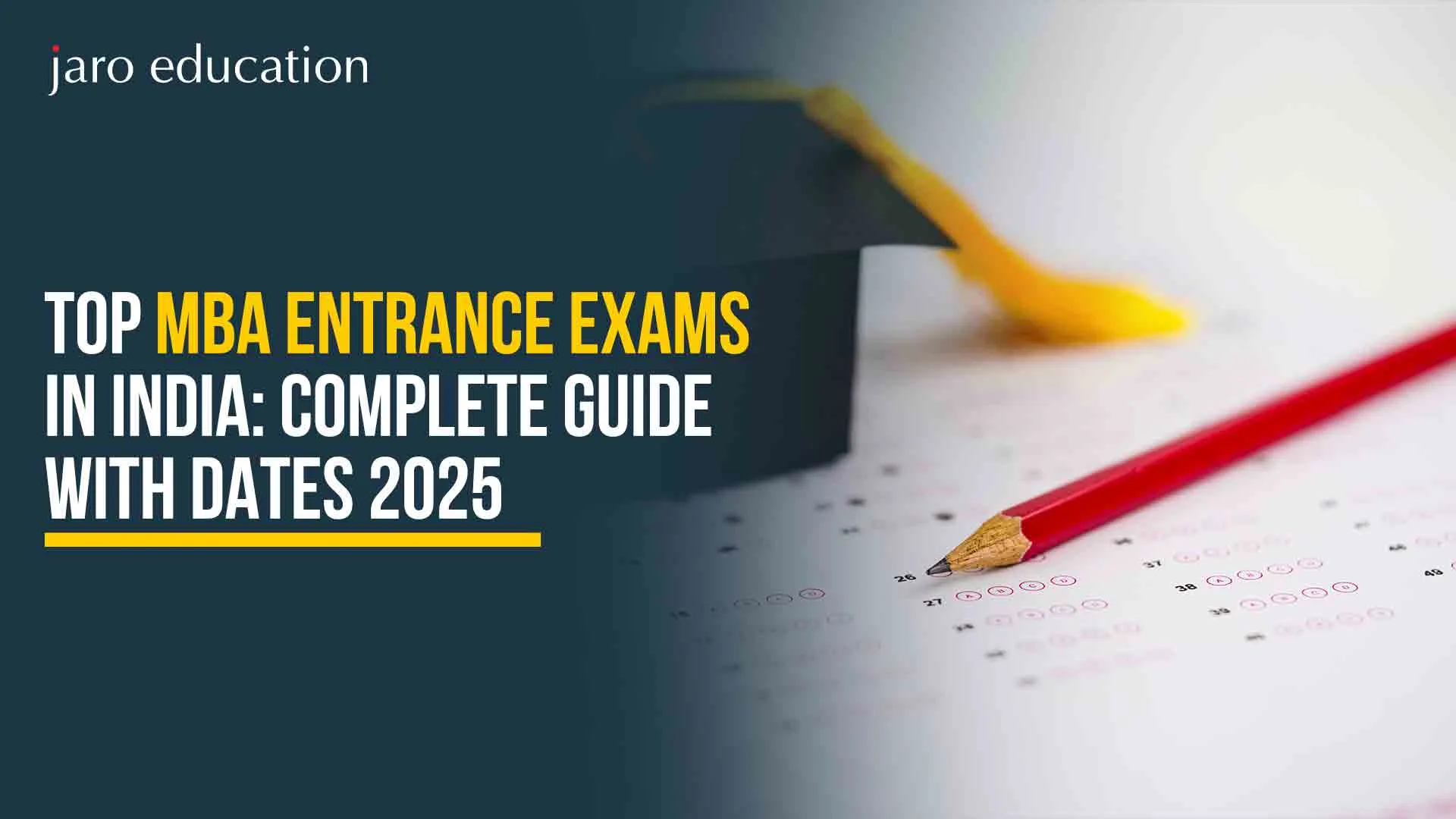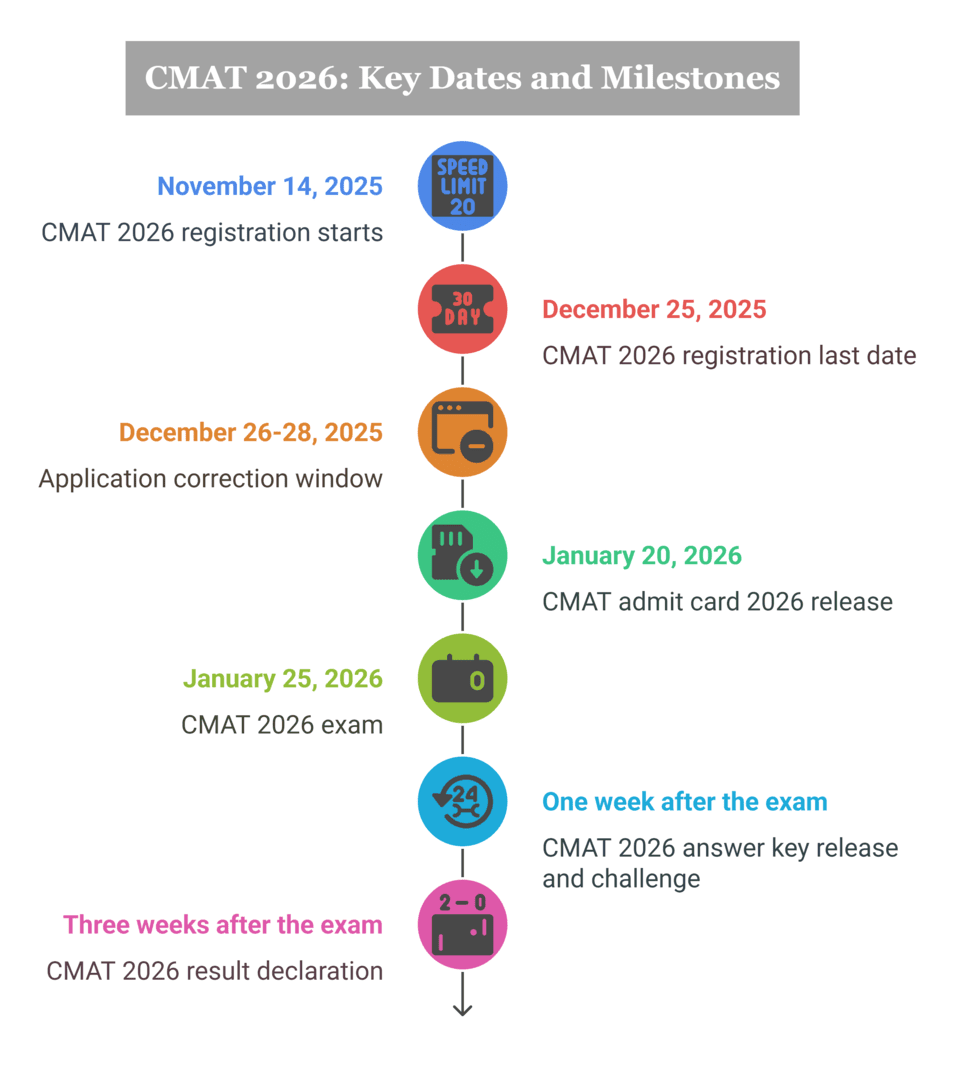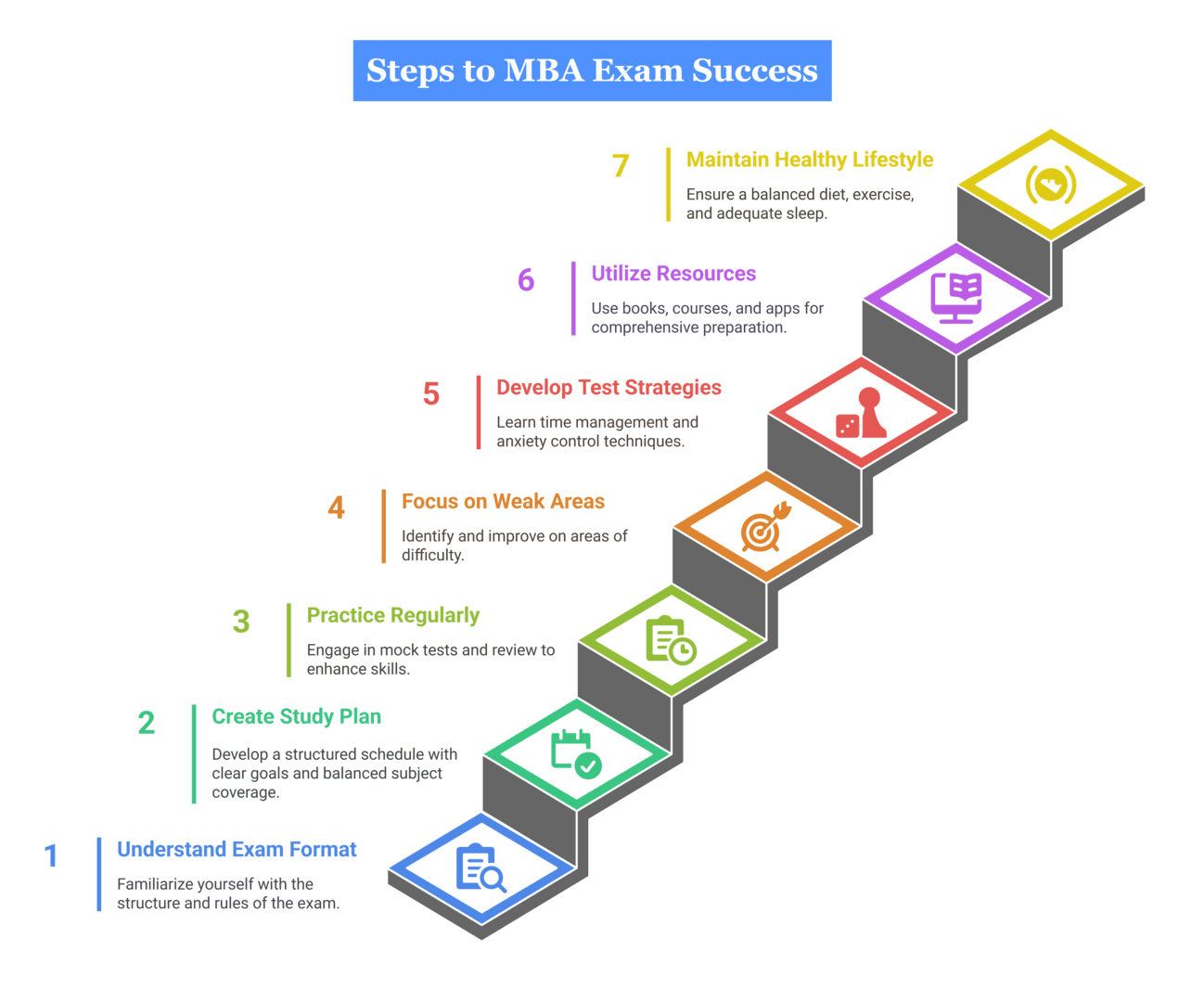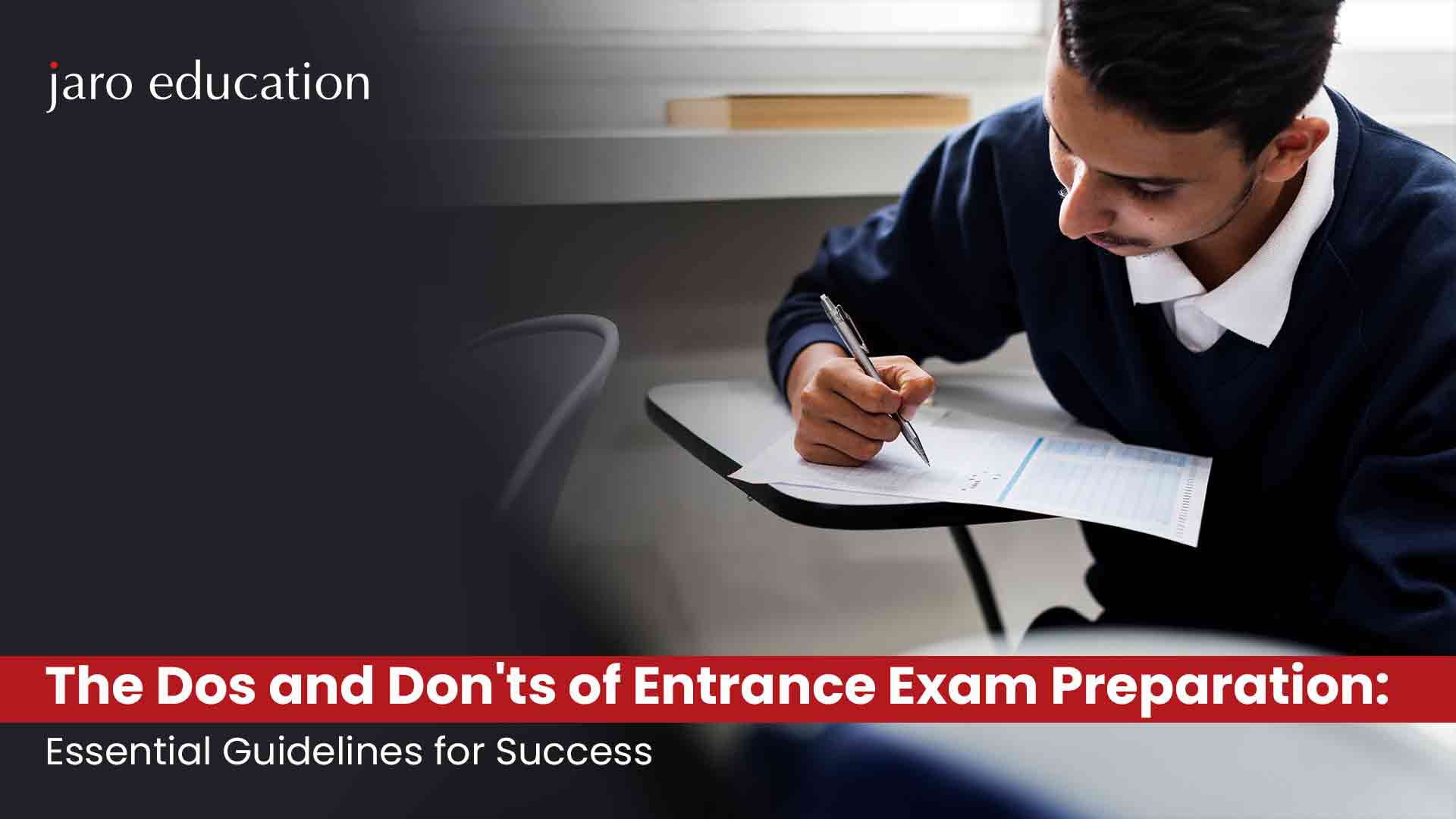Top MBA Entrance Exams in India: Complete Guide with Dates 2025
Table of Contents

- jaro Education
- 22, May 2024
- 5:44 pm
Pursuing an MBA (Master of Business Administration) is a significant step toward advancing one’s career in the field of business and management. In India, numerous prestigious MBA entrance exams are conducted annually by various institutions and organizations. These exams serve as gateways to admission into top-tier business schools and management institutes across the country. This guide provides detailed information about the top MBA entrance exams in India for the year 2025, including eligibility criteria, exam patterns, syllabus, important dates, entrance tests for MBA, and preparation strategies.
Top MBA Entrance Exams Dates 2025: Your Gateway to Success
Here are the various MBA entrance exam test syllabuses, eligibility requirements, exam patterns, and application fees:
1. Common Admission Test (CAT)
| CAT Full Form | Common Admission Test |
|---|---|
| Conducting Body | Indian Institute of Management Kozhikode-expecting |
| Exam Dates | November 2025 |
| Eligibility Criteria | Graduation with an overall 50% score (45% for SC/ST candidates) |
| Mode of Application | Online |
| Exam Format | CBT |
| Marking Scheme | +3 for each correct answer and -1 for each inaccurate answer |
| Application Form Fees | INR 2,500 for the General category and INR 1,250 for SC/ST/PwD |
| CAT Syllabus | Verbal Ability & Reading Comprehension (VARC) Data Interpretation & Logical Reasoning (DILR) Quantitative Ability (QA) IIM CAT CAT |
| Official Website | iimcat.ac.in |
2. CMAT (Common Management Admission Test)
The Common Management Admission Test (CMAT) is a national-level entrance test for MBA admission to management programs across the country. Formerly conducted by the All India Council for Technical Education (AICTE) until 2018, the National Testing Agency (NTA) has been responsible for organizing the test since 2019. The NTA will administer the CMAT-2021. It is one of the easiest MBA entrance exams.
| Exam Conducting Agency | National Testing Agency (NTA) |
| Full-Form | Common Management Admission Test |
| Date of Examination | January 25th, 2026 |
| Mode of Examination | Online Computer-Based Test |
| Difficulty Level of Examination | Easy to Moderate |
| Total Time for CMAT | 180 minutes Total Questions 100 |
| Marking Scheme | +4 for every correct answer -1 for every wrong answer |

3. IBSAT (ICFAI Business School Aptitude Test)
The ICFAI Business Studies Aptitude Test (IBSAT) is a national-level entrance test for MBA conducted for admission to the MBA programs offered by ICFAI Business School (IBS) Hyderabad, IBS Dehradun, and IBS Jaipur. These business schools are administered by the Institute of Chartered Financial Analysts of India (ICFAI), established as a not-for-profit educational society in 1984.
| IBSAT Full Form | ICFAI Business Studies Aptitude Test |
| Application Period | 1st July- 3rd week of December 2025 |
| Test Dates | December 28-29, 2025 |
| Results | 1st Week of January 2026 |
| Selection Briefings | Between 10th and 19th January 2026, at 70+ locations across India, major cities and towns included. |
| Selection Procedure for MBA/PGPM | From 15th to 24th February 2026 at IBS Hyderabad, Hyderabad |
| Exam Duration | 2 hours, and it comprises 140 questions Questions are multiple-choice, and there's no negative marking |
4. XAT (Xavier Aptitude Test)
The Xavier Aptitude Test (XAT) is a national-level entrance test for MBA conducted by XLRI (Xavier School of Management), Jamshedpur, for admission to management programs at XLRI and 148 other participating XAT institutes across the country. For more than 60 years, XLRI has been conducting admission tests in India to select the most suitable candidates for management education. Each year, approximately 90,000 candidates take the XAT exam.
| Registration opens | 15 July 2025 |
| Registration closes | 30 November 2025 |
| Admit card download | 20 December 2025 (tentative) |
| XAT Exam date | 05 January 2026, 2:00 pm to 5:30 pm |
| Shortlist for Interview | Mid-February - Mid-March |
| Offers and Waitlist | April 2026 |
| Academic Session | usually begins mid-June 2026 |
5. SNAP (Symbiosis National Aptitude Test)
The Symbiosis National Aptitude Test (SNAP Test) is an entrance test for MBA admission offered by Symbiosis International (Deemed) University. It serves as the gateway to admission in MBA/PGDM programs offered by its 16 constituent institutes. The Symbiosis International University (SIU) provides MBA/PGDM courses in a wide range of popular and niche specializations.
| SNAP Full Form | Symbiosis National Aptitude Test |
| Conducting Body | SIU (Symbiosis International University) |
| Exam Level | National Level |
| Exam Frequency | Thrice a year |
| SNAP 2024 Dates | 08, 15, and 21 December |
| Mode of Examination | Candidates will take SNAP 2025 online from home or wherever they want, using their computers or laptops. |
| Exam Duration | 1 hour |
| Application Fees | INR 2250 per attempt |
| Maximum Age Limit | No upper age limit |
| Cities of Examination | 100+ |
| Official Website | www.snaptest.org |
| Number Of Test Takers | 75, 000+ |
| Helpdesk | 18001231454, info@snaptest.org |
6. MAH MBA CET (Maharashtra MBA Common Entrance Test)
The Maharashtra MBA Common Entrance Test (MAH MBA CET) is a state-level entrance test for MBA/MMS programs offered by over 300 colleges and institutes in Maharashtra. The exam is annually conducted by the Maharashtra State CET Cell and takes place from March to April.
| Exam Name | MAH MBA/MMS-CET or MAH-CET |
| Conducting Body | State Common Entrance Test Cell, Maharashtra |
| Exam Level | Postgraduate exam at the state level |
| Exam Frequency | Annual |
| Mode of Exam | Computed-Based Test (CBT) |
| Total Registrations | About 1 lakh |
| Courses offered through Entrance Exam | MBA/MMS/PGDM |
| Exam Fees | INR 1,000 (General category) INR 800 (Reserved category) |
| Exam Duration | 2.5 hours |
| Total Marks | 200 |
| Total Questions | 200 |
| Marking Scheme | One mark for each correct entry Zero marks for each incorrect/skipped entry |
| Language/Medium of Exam | English |
| Colleges Accepting Exam Scores | JBIMS, SIMSREE, PUMBA, Prin. LN Welinkar, Balaji Institute of Modern Management, ITM Business School, etc. |
7. NMAT (Narsee Monjee Management Aptitude Test)
NMAT stands for Narsee Monjee Institute of Management Studies (NMIMS) Management Aptitude Test. It is an annual MBA entrance exam conducted by NMIMS University for admission to various management programs offered by NMIMS and other prestigious business schools in India.
| NMAT Exam Particulars | Key Details |
| NMAT 2025 Exam Conducting Body | Graduate Management Admission Council (GMAC) |
| NMAT Official Website | mba.com/exams/nmat |
| Top MBA colleges under NMAT 2025 | NMIMS, XIMB, VIT, TAPMI, ICFAI, Shiv Nadar, SDA Bocconi, |
| NMAT 2025 Exam Dates | From November to December 2025 |
| NMAT Exam Time Duration | 2 hours |
| NMAT Marking Scheme | 12-120 points per section (36-360 total marks) |
| Does NMAT have a Sectional Time Limit? | Yes, and it is different for each section |
| Choice of determining the order of sections | Yes, available only once |
| Exam Difficulty Level | Moderate as compared to CAT, XAT, SNAP |
| Exam application process | Online |
| How to Register for the Exam? | Visit the NMAT official website and complete the registration |
| NMAT 2025 Exam Application Fee | Rs.3000/- ++ |
| Number of Times you can Take the NMAT exam 2025 | Three |
8. MAT (Management Aptitude Test) February Session
The Management Aptitude Test (MAT) has been a standardized test conducted since 1988 to assist business schools (B-schools) in selecting candidates for admission to MBA and related programs. In 2003, the Government of India’s Ministry of HRD approved MAT as a national-level test. Any B-school, whether national or international, can use MAT scores as part of their admission criteria, based on the scorecards issued to candidates. As the largest test of its kind in the country, MAT serves as a gateway to over 600 B-schools across India.
| Eligibility | Candidates must hold a bachelor’s degree in any discipline from a recognized university or its equivalent. Students in the final year of their bachelor’s degree course are also eligible to appear for MAT. |
| Exam Pattern | The MAT 2025 exam will consist of 150 questions distributed across 5 sections, with 30 questions in each section. Students will have a total of 120 minutes to complete the paper. Since there are no sectional time limits, students can strategically allocate their time across sections to maximize their scores. |
| Syllabus | The syllabus for the MAT exam is similar to that of other MBA entrance exam tests, comprising five subjects: Language Comprehension, Intelligence and Critical Reasoning, Data Analysis and Sufficiency, Mathematical Skills, and Indian and Global Environment |
| Application Fee | The MAT application fee remains consistent across all exam modes, requiring candidates to pay INR 2100 for each attempt, regardless of the mode chosen. If a candidate opts to combine two attempts (e.g., IBT+IBT, PBT+CBT, IBT+PBT, IBT+CBT), they will need to pay an additional INR 1200. |
National-Level MBA Entrance Examinations and Participating Institutions
Here’s an MBA entrance exam test list and the prestigious institutes accepting their scores:
- CAT (Common Admission Test)– Accepted by 21 IIMs, FMS, IMI, IMT, MDI, SPJIMR, IITs, TAPMI, and over 500 other institutes.
- CMAT (Common Management Admission Test)– Recognised by K J Somaiya, BIMTECH, GIM, VIT, Great Lakes, and all AICTE-approved MBA/PGDM offering institutions.
- XAT (Xavier Aptitude Test)– Scores accepted by XLRI, XIME, GIM, Great Lakes, IMT, XIMB, TAPMI, FORE, LIBA, and more than 140 other institutes.
- SNAP (Symbiosis National Aptitude Test)– Recognized by SIBM, SIIB, SCMHRD, SICSR, SIOM, SIMS, SIMC, SIDTM, SCIT, and other Symbiosis institutes.
- NMAT (Narsee Monjee Management Aptitude Test)– Accepted by NMIMS Mumbai, K J Somaiya, SPJIMR, SDA Bocconi Asia Center, XIM, ICFAI Business School, and others.
- IBSAT (ICFAI Business School Aptitude Test) – Scores accepted by IBS Hyderabad and all other 8 campuses of ICFAI B-Schools.
- MAT (Management Aptitude Test)– Accepted by Amity University Noida, Amrita School of Business, LPU, New Delhi Institute of Management, Christ University, and numerous others.
- ATMA (AIMS Test for Management Admissions)– Accepted by Master School of Management, Xavier Business School, Welingkar Institute of Management, SPJIMR, and other leading institutes.
How To Prepare Yourself For MBA Entrance Exam

It takes patience, careful planning, and constant practice to be prepared for any MBA entrance examination. Understand how the exam is organized, develop a disciplined plan for preparation without much procrastination in your weak areas, and live well; then you can be on your way to securing a score of your choice. With hard work and a positive attitude, all obstacles can be swept away easily.
Conclusion
These top MBA entrance exams in India offer aspiring candidates the opportunity to pursue their management education from prestigious institutes and enhance their career prospects. By understanding the eligibility criteria, exam patterns, and important dates for these exams, candidates can effectively prepare and perform well in their MBA entrance journey. Whether it’s CAT, XAT, GMAT, MAT, or SNAP, each exam presents its unique challenges and opportunities to showcase the candidate’s aptitude and potential in the field of management. By strategically planning for the MBA entrance examinations, the students can fulfill their journey toward their academic and professional aspirations in 2025.
Frequently Asked Questions
An MBA entrance exam is a standardized test that evaluates candidates’ aptitude for pursuing a Master of Business Administration (MBA) program. These exams assess skills in areas like quantitative ability, verbal reasoning, data interpretation, and general knowledge.
An MBA entrance exam is important because it helps business schools evaluate applicants’ intellectual capabilities, problem-solving skills, and readiness for the rigorous curriculum of an MBA program. It serves as a primary criterion for admission to top business schools.
Some of the most popular MBA entrance exams include:
- GMAT (Graduate Management Admission Test): Widely recognized for international MBA admissions.
- GRE (Graduate Record Examinations): Accepted by some business schools as an alternative to the GMAT.
- Common Admission Test: This is primarily for admission to top business schools in India, including IIMs.
- XAT (Xavier Aptitude Test): Used by many institutions, especially the Xavier School of Management.
- MAT (Management Aptitude Test): Accepted by several business schools in India.
- SNAP (Symbiosis National Aptitude Test): For admission to Symbiosis International University.
- ATMA (AIMS Test for Management Admissions): This is another test for Indian institutions.
Typically, MBA entrance exams consist of the following sections:
- Quantitative Ability (QA): Tests your mathematical skills, including arithmetic, algebra, and data interpretation.
- Verbal Ability (VA): Assesses grammar, comprehension, vocabulary, and language proficiency.
- Logical Reasoning (LR): Tests analytical and reasoning abilities through puzzles and problem-solving exercises.
- Data Interpretation (DI): Focuses on analyzing and interpreting data in tables, charts, and graphs.
- General Knowledge/Current Affairs: Found in some exams, testing awareness of global events, business, and political developments.
Preparation for an MBA entrance exam can be done through the following:
- Time management: Set a regular study schedule with dedicated time for each section.
- Practice papers: Regularly solve mock tests and past-year papers to understand the exam pattern and improve speed.
- Study materials: Use reliable books, online resources, and coaching institutes that offer expert guidance.
- Focus on weak areas: Identify and work on areas where you need improvement, especially in subjects like mathematics or logical reasoning.









